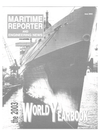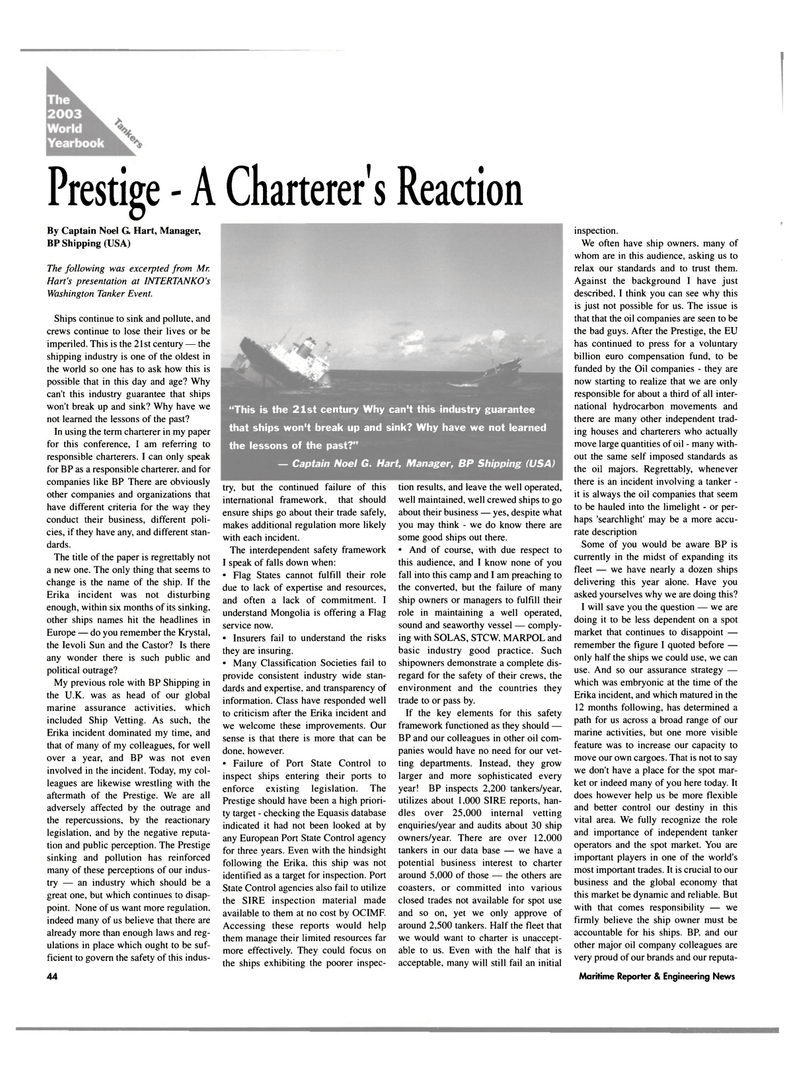
Page 44: of Maritime Reporter Magazine (June 2003)
Read this page in Pdf, Flash or Html5 edition of June 2003 Maritime Reporter Magazine
Prestige - A Charterer's Reaction
By Captain Noel G. Hart, Manager,
BP Shipping (USA) "This is the 21st century Why can't this industry guarantee that ships won't break up and sink? Why have we not learned the lessons of the past?" — Captain Noel G. Hart, Manager, BP Shipping (USA)
The following was excerpted from Mr.
Hart's presentation at INTERTANKO's
Washington Tanker Event.
Ships continue to sink and pollute, and crews continue to lose their lives or be imperiled. This is the 21st century — the shipping industry is one of the oldest in the world so one has to ask how this is possible that in this day and age? Why can't this industry guarantee that ships won't break up and sink? Why have we not learned the lessons of the past?
In using the term charterer in my paper for this conference, I am referring to responsible charterers. I can only speak for BP as a responsible charterer, and for companies like BP There are obviously other companies and organizations that have different criteria for the way they conduct their business, different poli- cies, if they have any, and different stan- dards.
The title of the paper is regrettably not a new one. The only thing that seems to change is the name of the ship. If the
Erika incident was not disturbing enough, within six months of its sinking, other ships names hit the headlines in
Europe — do you remember the Krystal, the Ievoli Sun and the Castor? Is there any wonder there is such public and political outrage?
My previous role with BP Shipping in the U.K. was as head of our global marine assurance activities, which included Ship Vetting. As such, the
Erika incident dominated my time, and that of many of my colleagues, for well over a year, and BP was not even involved in the incident. Today, my col- leagues are likewise wrestling with the aftermath of the Prestige. We are all adversely affected by the outrage and the repercussions, by the reactionary legislation, and by the negative reputa- tion and public perception. The Prestige sinking and pollution has reinforced many of these perceptions of our indus- try — an industry which should be a great one, but which continues to disap- point. None of us want more regulation, indeed many of us believe that there are already more than enough laws and reg- ulations in place which ought to be suf- ficient to govern the safety of this indus- 44 try, but the continued failure of this international framework, that should ensure ships go about their trade safely, makes additional regulation more likely with each incident.
The interdependent safety framework
I speak of falls down when: • Flag States cannot fulfill their role due to lack of expertise and resources, and often a lack of commitment. I understand Mongolia is offering a Flag service now. • Insurers fail to understand the risks they are insuring. • Many Classification Societies fail to provide consistent industry wide stan- dards and expertise, and transparency of information. Class have responded well to criticism after the Erika incident and we welcome these improvements. Our sense is that there is more that can be done, however. • Failure of Port State Control to inspect ships entering their ports to enforce existing legislation. The
Prestige should have been a high priori- ty target - checking the Equasis database indicated it had not been looked at by any European Port State Control agency for three years. Even with the hindsight following the Erika, this ship was not identified as a target for inspection. Port
State Control agencies also fail to utilize the SIRE inspection material made available to them at no cost by OCIMF.
Accessing these reports would help them manage their limited resources far more effectively. They could focus on the ships exhibiting the poorer inspec- tion results, and leave the well operated, well maintained, well crewed ships to go about their business — yes, despite what you may think - we do know there are some good ships out there. • And of course, with due respect to this audience, and I know none of you fall into this camp and I am preaching to the converted, but the failure of many ship owners or managers to fulfill their role in maintaining a well operated, sound and seaworthy vessel — comply- ing with SOLAS, STCW, MARPOL and basic industry good practice. Such shipowners demonstrate a complete dis- regard for the safety of their crews, the environment and the countries they trade to or pass by.
If the key elements for this safety framework functioned as they should —
BP and our colleagues in other oil com- panies would have no need for our vet- ting departments. Instead, they grow larger and more sophisticated every year! BP inspects 2,200 tankers/year, utilizes about 1,000 SIRE reports, han- dles over 25,000 internal vetting enquiries/year and audits about 30 ship owners/year. There are over 12,000 tankers in our data base — we have a potential business interest to charter around 5,000 of those — the others are coasters, or committed into various closed trades not available for spot use and so on, yet we only approve of around 2,500 tankers. Half the fleet that we would want to charter is unaccept- able to us. Even with the half that is acceptable, many will still fail an initial inspection.
We often have ship owners, many of whom are in this audience, asking us to relax our standards and to trust them.
Against the background I have just described, I think you can see why this is just not possible for us. The issue is that that the oil companies are seen to be the bad guys. After the Prestige, the EU has continued to press for a voluntary billion euro compensation fund, to be funded by the Oil companies - they are now starting to realize that we are only responsible for about a third of all inter- national hydrocarbon movements and there are many other independent trad- ing houses and charterers who actually move large quantities of oil - many with- out the same self imposed standards as the oil majors. Regrettably, whenever there is an incident involving a tanker - it is always the oil companies that seem to be hauled into the limelight - or per- haps 'searchlight' may be a more accu- rate description
Some of you would be aware BP is currently in the midst of expanding its fleet — we have nearly a dozen ships delivering this year alone. Have you asked yourselves why we are doing this?
I will save you the question — we are doing it to be less dependent on a spot market that continues to disappoint — remember the figure I quoted before — only half the ships we could use, we can use. And so our assurance strategy — which was embryonic at the time of the
Erika incident, and which matured in the 12 months following, has determined a path for us across a broad range of our marine activities, but one more visible feature was to increase our capacity to move our own cargoes. That is not to say we don't have a place for the spot mar- ket or indeed many of you here today. It does however help us be more flexible and better control our destiny in this vital area. We fully recognize the role and importance of independent tanker operators and the spot market. You are important players in one of the world's most important trades. It is crucial to our business and the global economy that this market be dynamic and reliable. But with that comes responsibility — we firmly believe the ship owner must be accountable for his ships. BP, and our other major oil company colleagues are very proud of our brands and our reputa-
Maritime Reporter & Engineering News

 43
43

 45
45
